Spinnaker 2024 grants announced!
Nine grants were awarded, totalling $175,000, to leading researchers from Fiona Stanley Hospital, Rockingham General Hospital and Curtin University.
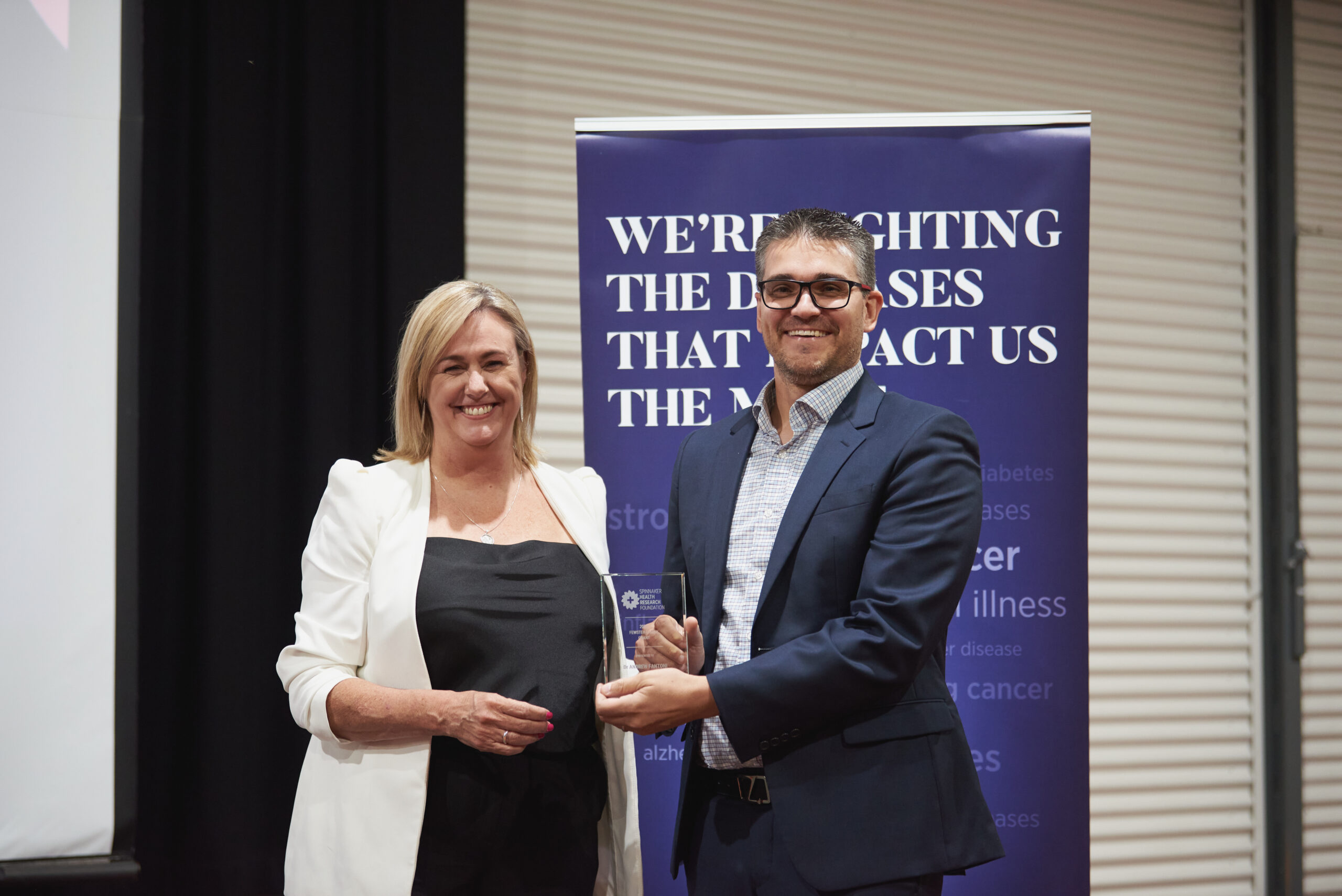
Nine grants were awarded, totalling $175,000, to leading researchers from Fiona Stanley Hospital, Rockingham General Hospital and Curtin University.

Innovative new research into cancers, heart transplantation, pregnancy, middle ear implants and ageing is set to benefit patients in southern Perth and beyond thanks to funding by the Spinnaker Health Research Foundation announced this month.
Nine grants were awarded, totalling $175,000, to leading researchers from Fiona Stanley Hospital, Rockingham General Hospital and Curtin University.
Dana Wallace-Campbell, Spinnaker Executive Director, said the projects would not only have a local impact, but a regional, national and global benefit as well.
“Spinnaker prides ourselves on funding the best and brightest research that meets the needs of our local community, but also having an impact much wider than that,” Ms Wallace-Campbell said.
“We can only do that because of the generous gifts of our community and the trust they have in us to find solutions to our biggest health problems.”
“Our recent partnership with national charity The Hospital Research Foundation Group will enhance the impact of our grants, ensuring our research is broadly relevant, leads to innovation and can be translated to clinical practice beyond our own hospitals, maximising the best possible outcomes for patients.”
The nine projects are as follows:
| Dr Collin Chin – lymphoma Rockingham General Hospital |
| An emerging new treatment for blood cancers is called CAR T-cell therapy, where a patient’s own cancer-fighting immune cells (T-cells) are genetically engineered in a lab to create ‘supercharged’ CAR T-cells, which are then returned to the patient to better recognise and attack the cancer. To make this treatment even better and save more lives, we need to understand how it affects the immune cells over time. This project will use a technology called ‘flow cytometry’ to study the impact on individual blood cells, and ultimately improve this treatment for patients. |
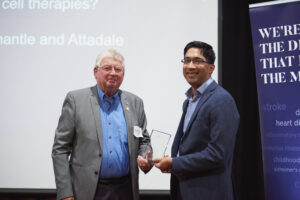 Pictured: Kim Passmore (Left) and Dr Shane Gangatharan (Right) accepting award on behalf of Dr Collin Chin |
| Dr Andrew Fantoni – lung cancer Fiona Stanley Hospital |
| Lung cancer is the leading cause of cancer-related death in Aboriginal Australians, and diagnosis is double that of non-Aboriginal people. Early detection and treatment gives the best outlook for lung cancer, however it is unknown whether WA Indigenous Australians have access to testing at all. This project will investigate the gaps in cancer testing and treatment in Aboriginal and remote populations, while also looking into whether biological features are more common in Aboriginal people to better plan treatments. |
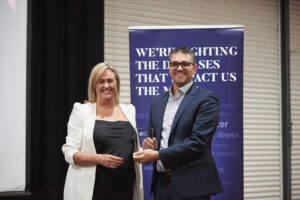 Pictured: Dana Wallace-Campbell (Left) and Dr Andrew Fantoni (Right) |
| Dr Marcus Voola – middle ear implants Fiona Stanley Hospital |
| Middle ear implants are effective hearing aids for many people, however programming the implants is complex and subjective – relying on recipients to indicate when the sound is “loud but comfortable” which can be hard for children or those with communication or intellectual challenges. To combat these pitfalls, this project aims to develop and validate a new programming method that removes this subjective nature. An objective programming method will be developed using activity of the brain, and which has already proven to be effective for people with cochlear implants. |
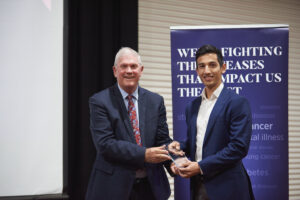 Pictured: Mayor Logan K. Howlett (Left) and Dr Marcus Voola (Right) |
| Ms Nicole Catalano – pregnancy South Metropolitan Health Service |
| Group B Streptococcus (GBS) is a common bacteria found in the vagina and rectum. Usually it is harmless, but it can cause problems in pregnancy and if transferred to the baby, can be deadly. While routine GBS testing is common during pregnancy and treated with antibiotics, this study aims to prevent women from getting GBS in the first place. It will test whether simple lifestyle and diet changes (such as taking Vitamin D supplements and pre/probiotic foods, limiting sugar and increasing exercise) can reduce GBS rates. |
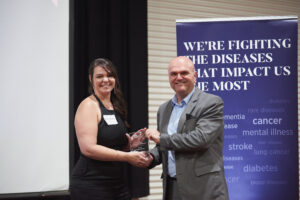 Pictured: Nicole Catalono (Left) and Colin La Galia (Right) |
| Dr Andrew Redfern – breast cancer Fiona Stanley Hospital | University of Western Australia |
| Statin drugs (traditionally used to treat high blood cholesterol) have recently been explored as a treatment for breast cancer, as they are thought to interfere with a crucial cholesterol-making process within cancer cells. However, it is not clear which types of breast cancer (hormone sensitive, HER2 positive or triple negative) statins work for, nor the impact of side effects. This study will analyse 2500 breast cancer patients with varying types of breast cancer and statin use, to provide insights into who statins are best targeted at as a treatment for breast cancer. |
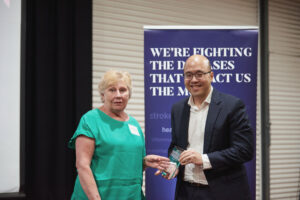 Pictured: Helen Eaves (Left) and Dr Leone Oh (Right) accepting award on behalf of Dr Andrew Redfern |
| Dr Tom Ferguson – prostate cancer Fiona Stanley Hospital |
| An advanced type of prostate cancer which has no cure is called ‘metastatic castration-resistant prostate cancer’ (mCRPC). A radiation substance called Lu-PSMA is currently used to help treat mPRPC, delivered through a needle in the patient’s vein every six weeks. For other cancers, an oral medicine called capecitabin chemotherapy is used alongside Lu-PSMA to make the radiation work better. However no one has tested this combination as a treatment for prostate cancer. This project aims to see whether this combination can help men with mCRPC live longer and with better quality of life, while also refining safe dosages. |
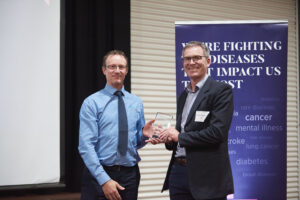 Pictured: Tristan Leopold (Left) and Dr Tom Ferguson (Right) |
| Dr Warren Pavey – heart transplantation Fiona Stanley Hospital | Heart and Lung Research Institute WA |
| Only one in three hearts offered for organ donation are actually transplanted, due to damage suffered during the death of the donor. If more of these hearts were useable, many more patients could receive an organ and have a new lease on life. New therapies are needed to reduce the damage hearts suffer during the death of their donor. This project will explore whether ergothioneine (EGT) – a naturally occurring amino acid – has the potential to protect hearts that have stopped beating or suffered stress during donation. |
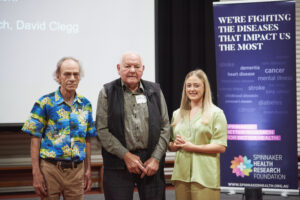 Pictured: David Clegg (Left), Len Mihaljevich (Center) and Abbey Hannaway (Right) accepting award on behalf of Dr Warren Pavey |
| Prof Merrilee Needham – ageing Fiona Stanley Hospital | Murdoch University | University of Notre Dame Australia |
| Inclusion body myositis (IBM) is a disease affecting older people, causing progressive loss of muscle strength, disability and falls. In this disease, the immune system self-attacks the muscles and causes inflammation, in part due to B cells that produce antibodies which target the muscles. This project aims to identify the protein sequence that is making up these antibodies, in order to develop new drugs to block them. |
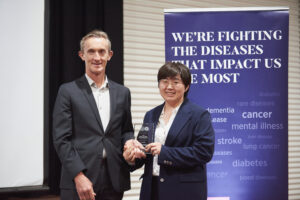 Pictured: Tim Leen (Left) and Aska Yang (Right) accepting award on behalf of Prof Merrilee Needham |
| Prof Yu Yu – melanoma Curtin University |
| Primary brain melanomas are rare, extremely aggressive tumours that do not respond to current treatments. As they are so rare, there is little information on them or opportunity to study them. The family of a 34-year-old woman who died from a primary brain melanoma at the Royal Perth Hospital has generously offered her tumour for research to help future diagnoses. This project aims to improve understanding of this melanoma through a cutting-edge technique that will allow the team to look at many tumour growth molecules in this patient’s tumour, to find out which were responsible for the aggressive behaviour of her cancer. |
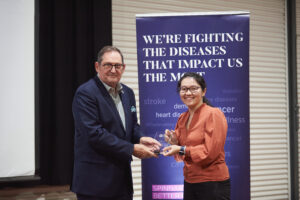 Pictured: Neil Pinner (Left) and Dr Yu Yu (Right) |